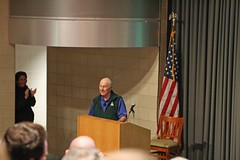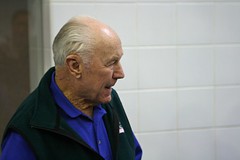Retrophisch
An evening with a living legend
Thanks to the best wife in the world, my Valentine’s Day gift arrived three days early. Last night I was privileged, along with a couple hundred others, to spend some time with General Charles “Chuck” Yeager.
General Yeager has long been a hero of mine. He was one of many reasons I entered Air Force ROTC in college. His exploits, as portrayed in The Right Stuff, kept my friend Matt and I up late into the night on more than one occasion. When she learned he was going to be in town as part of a fundraiser for the C.R. Smith Museum, my wife thought I would enjoy attending, and oh, was she ever right.

We watched a 20-minute clip from a DVD about the general, and then he spoke for about an hour and a half, discussing his experiences from World War II onward, and taking questions from the audience.
Some of his recollections and observations that I can remember, in no particular order:
- General Yeager has flown nearly every aircraft in the Air Force inventory, and myriads of planes that never made it in to service.
- His favorite jet currently in American service is the F-15E. Given his opinions, one can surmise that he believes taxpayer resources would have been better spent upgrading and improving this aircraft, rather than investing in the F-22 and F-23. He referred to the F-22 specifically, as well as the F-16, as "great for air shows," but not so great for modern air combat.
- In October of last year, he went to France and flew the Airbus A380. General Yeager was very impressed with the "hotel with wings" (his words), and its stability. He told us of the flight tests he took part in with the water drums loaded throughout the fuselage (to simulate passenger and equipment weights), and how they would be moved about to change the plane's center of gravity, and the 380 would take it all in stride.
- During the Airbus visit, he was reunited with some of the Maquis resistance fighters who'd sheltered him for three months after he was shot down over southern France. "There's not many of them left; they're all older than me."
- He's convinced France is the second-best country in modern aviation, behind the United States.
- He lamented the consolidation of the aircraft industry in the U.S. When he was a test pilot, flying 25-30 different aircraft each month, the Defense Department could choose from myriad contractors: Lockheed, North American, Grumman, Corvair, Rockwell, Boeing, Bell, Martin, and McDonnell Douglas. It was extremely competitive, and the country was rewarded with the best possible aircraft for the best possible price. Now the industry has contracted to only three players, and these companies are free to "fleece" the government.
- On shooting down a Me 262 during World War II: while on a mission, Yeager's squadron encountered several 262s, but none engaged the P-51s. While passing over a particular area, the squadron came under antiaircraft fire. While spying where the flak was coming from, Yeager noted the guns were protecting a small airfield, and he saw 262s on the ground. He also saw a 262 coming in for a landing. He then lined up behind the 262 and destroyed it; "not very sportmanslike, but what the hell" was the general's sentiment. He noted with amusement that an antiaircraft battery at the end of the runway had turned its gun on him, now racing down the length of the runway about six feet off the deck, and, missing his Mustang, was hitting its own hangars at the opposite end of the field.

- He thought Tom Wolfe's portrayal of him and the Air Force in The Right Stuff was accurate; "pretty much how it really was." On NASA, the German scientists who helped build the rockets, Vice-President Johnson: not so much. "There was a lot of embellishment." (Yeager was a technical adviser for the movie, and flew several of the featured aircraft for the film.)
- Regarding the early period of space flight research in the U.S.: the Air Force owned the space program. They were in charge of all the training of pilots-cum-astronauts, ran the test facilities and aircraft, all on a miniscule budget. They did all of this with nary a mention in the press. Then Sputnik went up, Eisenhower made space a priority, NASA was born out of NACA, and the place became a bureaucratic and budgetary mess "and has been that way since." I gathered that he thought it outrageous that each of the original Mercury astronauts got his own press agent. Yeager has a very strong opinion about the space program, from which one might surmise that today it would be a very different, and likely much more successful, animal if it were still under the Air Force's purview.
- He does not regret ever going into space. He is especially proud that the men who came through the USAF Aerospace Research Pilot School, of which he was the first commandant, were among the Gemini, Apollo, and Space Shuttle astronaut crews.
- Though he retired from the Air Force in 1975, he continued to test fly for the Air Force. His payment was a dollar a year. When presented with the offer, Yeager says his only response was "I don't have to pay for the fuel, do I?" He's also performed test flights for many private companies, including foreign ones (viz: Airbus, above).
- Regarding his selection to fly the X-1: his dad was a natural gas driller in West Virginia, and as a 12 year-old, Yeager would help his dad repair dome regulators, which lowered the pressure of the gas so it could be more easily sent through pipes, atop drilled wells. Part of the gas system for the X-1's rockets included the same type of dome regulators. Yeager contends "In some ways, I knew the X-1's fuel system better than the guys who designed and built it, because I grew up with it." His background knowledge factored in to his selection.
- After three months in southern France, the Maquis resistance managed to get Yeager across the Pyrennes into Spain. Spain was neutral at the time, along with Switzerland and Sweden. Combatants who ended up in these countries were expected to pretty much ride out the war there. Spain had no petroleum resources of its own at the time, and due to the war, was having difficulty importing it. The U.S. agreed to an exchange of petroleum for several pilots, including Yeager, who had ended up there. The general joked, "Now I don't know how many barrels each of us was worth..."
- Improvement in technology aside, Yeager is indignant over the number of troops injured and killed by IEDs over the past few years on Iraq. He told us about how the Air Force used to assist the troops on the ground in the removal--via detonation/destruction--of roadside mines during Vietnam. (This involved the Bird Dog observer aircraft spotting and marking new disturbances in the ground alongside the roads, with ground attack aircraft following, strafing the marked positions.) He rhetorically wondered why something similar wasn't being done in Iraq, and contends it's because those running the war for the various services didn't serve in Vietnam.
- His last flight in a military jet of any kind was on 18 September 2007. Looking back through old flight logs, he discovered his first official flight in a military aircraft of any kind was 18 September 1942. He was obviously pleased with this 65-year run of flying military aircraft.
- He's a modest man who doesn't look at his accomplishments in the same light as the rest of us. One can understand that; living in the moment, you oftentimes fail to appreciate it for what it was at the time it happened. Yeager contends that he was simply in the right place at the right time, with the right set of skills.
Given that General Yeager’s 86th birthday will be on Friday, the 13th, a cake was brought out and the entire audience sang “Happy Birthday” to him. He thought it was a kick. He mingled briefly afterward, and had a slice of cake. There was no official signing or greeting line; the general either hadn’t planned to, or was too tired, to sign books and other items. All perfectly understandable.

It was disappointing to not be able to greet General Yeager personally, shake his hand, and thank him for his decades of service. But I am not disappointed in the overall experience. It was fantastic! If you ever have the chance to meet with General Yeager or hear him speak, do not miss such an opportunity with an authentic American hero.
Much love and thanks to Kelly for making last night possible for me! I love you, sweetheart!
